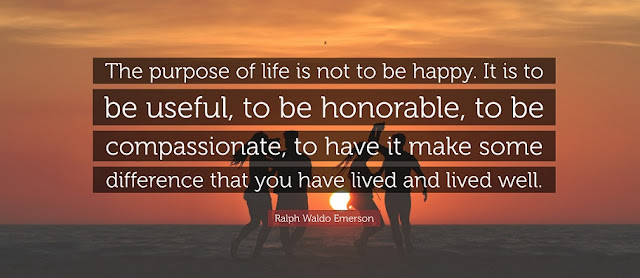My previous blog post was about a notable Dutch woman who was born in April 1892. Now I am writing about the core emphasis of a notable American man who died ten years before that, in April 1882. That man was the essayist, lecturer, and philosopher Ralph Waldo Emerson.
In this post, I am giving little biographical
information about Emerson, other than to say that he was born in Boston in 1803
and died in nearby Concord four weeks before his 79th birthday. Other
facts about Emerson’s life can be found (here) on Wikipedia.**
The Background of Emerson’s “Self-Reliance”
Emerson’s best-known essay is “Self-Reliance,”
first published in 1841 when he was still in his late 30s. Lying behind the
public issue of that 30-page essay was the philosophy of transcendentalism.
In 1836, Emerson and some of his friends formed
the Transcendental Club. Their core emphasis was derived from German
philosopher Immanuel Kant, whose book Critique of Pure Reason (1781) propounded
what became known as transcendental idealism.
That idealism held that there is an innate moral
law within people that forms their interpretation of life experiences. Emphasizing
what Kant called "intuitions of the mind,” transcendentalism was a
reaction against the extreme rationalism of the Enlightenment.
Such rationalism had encroached upon Harvard, where
Emerson had studied in the 1820s. In 1838, he was invited to address the graduating
class at Harvard Divinity School. That talk was highly praised by some, and
strongly criticized by others. (He was not invited to speak at Harvard again
until 1869!)
Emerson charged the Harvard graduates to turn
from the dead dogmas of the past and to seek the immediacy of Truth by mystical
contact with God in the present. He declared, “It is the office of the true
teacher [or preacher] to show us that God is, not was.”
The Core Ideas of Emerson’s “Self-Reliance”
As is apparently true of many others, I was
long under the mistaken idea that Emerson’s concept of self-reliance meant living/acting
independently without reliance on other people. But that was not his main
point.
Rather, Emerson stressed the importance of
trusting one’s own intuition for contact with God rather than relying on that
which had been believed and written in the past.
Although he was ordained as a (Unitarian)
minister and was a pastor for a couple of years at Boston’s historic Second
Church, he left that post in 1832 and never served as a pastor again. Rather,
he became a critic of “organized religion,” as evidenced by his 1838 address at
Harvard Divinity School.
Although the expression was likely not used
back then, Emerson was definitely an early example of a person who was “spiritual
but not religious.’ He saw religion as reliance upon a dead past, but he reveled
in the presence of God he saw in the present, largely through nature.
Theology has in recent decades been called
“faith seeking understanding”—and Emerson likely would not have been averse to
that description. His objection was to “theology seeking faith,” that is,
reliance on ideas of the past rather than upon one’s direct contact with God in
the present.
While there is much in Emerson’s thought with
which I disagree, I am in basic agreement with his emphasis on self-reliance.
A Selection of Emerson’s Words
I am ending this post about Emerson with some of my favorite statements he made through the years. The first are oft-quoted words from “Self-Reliance”:
I have been unable to find the source, but these words about the reality (or danger?) of new ideas are often attributed to Emerson, although they are sometimes said to be from Oliver Wendell Holmes (who was six years younger than Emerson):
The gist of the following quote is from a letter Emerson wrote his daughter Ellen in 1854:
There is also no documentation for this quote, but I close with these significant words that are certainly Emersonian, if not directly from Emerson himself:
_____
** I also enjoyed reading and recommend Self-Reliance:
The Story of Ralph Waldo Emerson (2010), a delightful 140-page book Peggy
Caravantes authored for junior high school students.
** For a deeper understanding of Emerson, I also recommend Emerson: The Ideal in America, an informative 2007 video available (here) on YouTube.





.jpg)